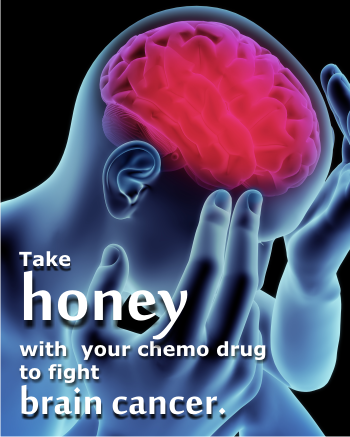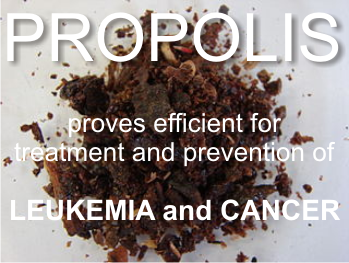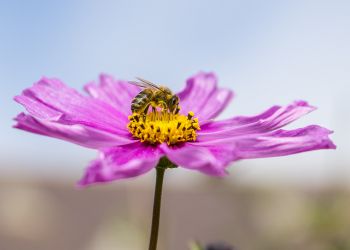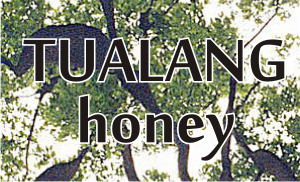Is honey good for cancer? Can it be considered a natural treatment to cancer? Or only prevention? Scientists have studied the ANTIMUTAGENIC AND ANTITUMOR EFFECTS of honey and gave us their answer.
The development of food industry is like a sward with two faces. It has made food incredibly tasty and easy to cook, but it has also brought some harmful components that enter our digestive system with that tasty food. Mutagenic substances act directly or indirectly by promoting mutations of genetic structure. For example, during the roasting and frying of food heterocyclic amines are built, e.g. Trpp-1 (3-Amino-1,4-dimethyl-5H-pyridol [4,3-b] indole). What are the natural ways to fight agaist them?
The antimutagenic activity of honey:
The influence of honey over the mutagenic substances was studied in 2002 by WANG, X H; ANDRAE, L; ENGESETH, N J in the study “Antimutagenic effect of various honeys and sugars against Trp-p-1” and published in the Journal of agricultural and food chemistry 50 (23): 6923-6928.
The antimutagenic activity of honeys from seven different floral sources: acacia, buckwheat, fireweed, soybean, tupelo and Christmas berry, against Trp-p-1 was tested via the Ames assay and compared to that of a sugar analogue and to individually tested simple sugars.
All honeys exhibited significant inhibition of Trp-p-1 mutagenicity. Glucose and fructose were found to be similar antimutagenic as honey and were more antimutagenic than maltose and sucrose.
Nigerose, another sugar, present in honey has immunoprotective activity.
Only honey from our honey bees has antimutagenic activity?
Not only the European honey bees make honey with antimutagenic activity. “Stingless bee honeys from west Amazonian Ecuador showed anti-mutagenic activity assayed with Saccharomyces cerevisiae D7 strain, inhibiting back mutation over the entire tested concentration range.”¹
Studies and tests?
On mouse and rats.
• Honey was applied in spontaneous mammary carcinoma, in methylcholanthrene-induced fibrosarcoma of CBA mouse and in anaplastic colon adenocarcinoma of Y59 rats, to study the antimetastatic effect of honey and its possible mode of antitumor action. Oral application of honey offered a statistically significant antimetastatic effect.² These findings indicate that
honey activates the immune system and honey ingestion may be advantageous with respect to cancer and metastasis prevention.
The authors also said that honey given orally, before tumour cell inoculation, may have an impact on tumour spreading.
 • The same group of scientists also studied the effect of honey on tumour growth, metastasising activity and induction of apoptosis and necrosis in murine tumour models (mammary and colon carcinoma) was investigated. A pronounced antimetastatic effect was observed when honey was applied before tumour-cell inoculation (peroral 2 g kg-1 for mice or 1 g kg-1 for rats, once a day for 10 consecutive days)³.
• The same group of scientists also studied the effect of honey on tumour growth, metastasising activity and induction of apoptosis and necrosis in murine tumour models (mammary and colon carcinoma) was investigated. A pronounced antimetastatic effect was observed when honey was applied before tumour-cell inoculation (peroral 2 g kg-1 for mice or 1 g kg-1 for rats, once a day for 10 consecutive days)³.
The anti-proliferative effect of honey in colon cancer cells was explained by its antioxidant and antiinflammatory properties.
• “Honey exerted antiproliferative potential against the HCT-15 and HT-29 colon cancer cells as assessed by 3- (4, 5-dimethylthiazol-2-yl)-2, 5-diphenyl tetrazolium bromide (MTT) assay. Flow cytometric analysis showed the increasing accumulation of hypodiploid nuclei in the sub-G(1) phase of cell cycle indicating apoptosis. Honey transduced the apoptotic signal via initial depletion of intracellular non protein thiols, consequently reducing the mitochondrial membrane potential (MMP) and increasing the reactive oxygen species (ROS) generation.
An increasing earlier lipid layer break was observed in the treated cells compared to the control. Honey induced apoptosis was accompanied by up-regulating the p53 and modulating the expression of pro and anti-apoptotic proteins. Further apoptosis induction was substantiated using DNA fragmentation assay and YO-PRO-1 staining.
 Results showed honey as a plausible candidate for induction of apoptosis through ROS and mitochondria-dependent mechanisms in colon cancer cells. This will promote honey as a potential chemotherapeutic agent against colon cancer.”4
Results showed honey as a plausible candidate for induction of apoptosis through ROS and mitochondria-dependent mechanisms in colon cancer cells. This will promote honey as a potential chemotherapeutic agent against colon cancer.”4
• Asian Pacific Journal of Cancer Prevention was publishing in 2012 the study of WEN, C T P; et al, the study “Gelam
and Nenas Honeys Inhibit Proliferation of HT 29 Colon Cancer Cells by Inducing DNA Damage and Apoptosis while Suppressing Inflammation.”
• Honey ingestion by rats induced antitumor and pronounced antimetastatic effects. The experimental evaluation of antitumor properties of honey was carried out using five strains of rat and murine tumors.
Honey potentiated the antitumor activity of 5-fluorouracil and cyclophosphamide,according to GRIBEL’, N V; PASHINSKII, V G (1990) [The antitumor properties of honey]. Voprosy Onkologii 36 (6):
704-709.
• In another study the antitumour effect of bee honey against bladder cancer was examined in vitro and in vivo in mice.5 According to these results honey is an effective agent for inhibiting in vitro the growth of different bladder cancer cell lines (T24, RT4, 253J and MBT-2). It is also effective when administered intralesionally or orally in the MBT-2 bladder cancer implantation mice models.
•3 Spanish honeys induced apoptosis in a concentration and time dependent-manner, in addition, honeys with the higher phenolic content, heather and polyfloral, were the most effective to induce apoptosis in HL-60 cells. However, honeys did not generate reactive oxygen species (ROS) and N-acetyl-L-cysteine (NAC) could not block honeys-induced apoptosis in HL-60 cells.
These data support that honeys induced apoptosis in HL-60 cells through a ROS-independent cell death pathway, indicating that the antiproliferative and apoptotic effects of honey varied according to the floral origin and the phenolic content.6
• Tsiapara et al. investigated the influence of Greek honey extracts (thyme, pine and fir honey) on the oestrogenic activity and cell viability of breast (MCF-7), endometrial (Ishikawa) and prostate (PC-3) cancer cells.
Thyme honey reduced the viability of Ishikawa and PC-3 cells, whereas fir honey stimulated the viability of MCF-7 cells. The authors concluded that modulation of oestrogen activity was linked to the rich phenolic content of Greek honeys and suggested that a thyme honey-enriched diet may prevent cancer related processes in breast, prostate and endometrial cancer cells.7
The antiproliferative activity, apoptosis, and the antitumor effects of honey on human renal cancer cell lines (ACHN) were studied. Honey decreased the cell viability in the malignant cells in a concentration-and time-dependent manner. Honey induced apoptosis of the ACHN cells in a concentration-dependent manner. It is concluded that honey may cause cell death in the ACHN cells by inducing apoptosis.8
Jungle honey, collected from tree blossom by wild honeybees that live in the tropical forest of Nigeria, enhanced immune functions and antitumour activity in mice.9
Tualang honey from Malaysia has: antiproliferative activity on OSCC and HOS cell lines, exerting early apoptosis effects and antitumor effects in experimental breast cancer in rats. (according to the study Inhibitory Effects of Tualang Honey on Experimental Breast Cancer in Rats: A Preliminary Study, by KADIR, E A et al, from 2013 and published in the Asian Pacific Journal of Cancer Prevention.)
Tualang honey induces apoptosis and disrupts the mitochondrial membrane potential of human breast and cervical cancer cell lines 10 and inhibits also primary human keloid fibroblasts.d.11
Manuka honey has antiproliferative activity of manuka honey on three different cancer cell lines, murine melanoma (B16.F1) and colorectal carcinoma (CT26) as well as human breast cancer (MCF-7) cells in vitro.
Heated honey has some advantages!
HMF, a compound found in heated honey has been found to possess antitumor properties, according to MICHAIL, K et al, in a 2007 study called “Overheated honeys could potentially compensate the loss of quality by winning anti-cancer properties.”
LifeMel Honey (LMH)
Dr. Jamal Zidon and his associates conducted a study at several hospitals in Israel on severely ill cancer patients with multiple types of cancers. These patients all suffered from acute febrile neutropenia (AFN), a life-threatening condition in which the white blood cell count is dangerously low. All of the patients required treatment with Colony Stimulating Factor (CSF), an expensive drug given to boost the immune system response.
The patients, while treated with various chemotherapy protocols, were also given a teaspoon of LMH for five days before their second round of chemotherapy doses. Remarkably, there was no recurrence of neutropenia after the honey treatment. Forty percent of the patients had no need for additional CSF treatments. Most patients included in the study group showed increased neutrophil counts, decreased occurrences of thrombocytopenia, and stabilized hemoglobin levels.


No specific biochemical mechanisms were given to explain the results, however the findings were consistent with other published reports citing the immune system enhancement effects of honey.
Conclusion?
By its activity of improving immune system functioning and impeding the replication and growth of cancer cells,
Honey consumption indirectly lowers overall cancer risks
and improves the body’s ability to fight cancer.
Overheated honeys could potentially compensate the loss of quality by winning anti-cancer properties.
Honey has been promoted for use in cancer treatment, research suggests that honey facilitates the ability of tumor cells to destroy themselves, thus inhibiting the growth of certain cancer cells. However there is need of more tests and clinical trials to prove honey’s efficiency in directly treating cancer, alone or in combination with other substances, outside the lab.
What are clinical and laboratory studies telling us?
That regular consumption of honey results in elevation of platelet counts, stabilization of hemoglobin levels, and improvements in white blood cell counts, all results being associated with improved immune system functioning.
***********
***********
References:
– Ron Fessenden, MD, MPH, The New Honey Revolution, Restoring the Health of Future Generations, 2014;
– Stefan Bogdanov, The honey book, Bee Product Science, February 2014, http://bee-hexagon.net;
¹ GUERRINI, A; BRUNI, R; MAIETTI, S; POLI, F; ROSSI, D; PAGANETTO, G; MUZZOLI, M;
SCALVENZI, L; SACCHETTI, G (2009) Ecuadorian stingless bee (Meliponinae) honey: A chemical and functional profile of an ancient health product. Food Chemistry 114 (4): 1413-1420;
² ORSOLIC, N; BASIC, I (2004) Honey as a cancer-preventive agent. Periodicum Biologorum 106 (4): 397- 401;
³ ORSOLIC, N; KNEZEVIC, A H; SVER, L; TERZIC, S; HECKENBERGER, B K; BASIC, I (2003) Influence of honey bee products on transplantable murine tumours. Vet.Comp.Oncology 1 (4): 216-226.
4 JAGANATHAN, S K; MANDAL, M (2010) Involvement of non-protein thiols, mitochondrial dysfunction, reactive oxygen species and p53 in honey-induced apoptosis. Investigational New Drugs 28 (5): 624- 633.
5 SWELLAM, T; MIYANAGA, N; ONOZAWA, M; HATTORI, K; KAWAI, K; SHIMAZUI, T; AKAZA, H (2003) Antineoplastic activity of honey in an experimental bladder cancer implantation model: in vivo and in vitro studies. International journal of urology 10 (4): 213-219;
6 MORALES, P; ISABEL HAZA, A (2013) Antiproliferative and apoptotic effects of spanish honeys, Pharmacognosy Magazine 9 (35): 231-237;
7 TSIAPARA, A; JAAKKOLA, M; CHINOU, I; GRAIKOU, K; TINA TOLONEN, V V A P M (2009) Bioactivity of Greek honey extracts on breast cancer (MCF-7), prostate cancer (PC-3) and endometrial cancer (Ishikawa) cells: Profile analysis of extracts. Food Chemistry 116: 702-708;
8SAMARGHANDIAN, S; AFSHARI, J T; DAVOODI, S (2011) Honey induces apoptosis in renal cell carcinoma. Pharmacognosy Magazine 7 (25): 46-52.;
9 FUKUDA, M; KOBAYASHI1, K; HIRONO1, Y; MIYAGAWA1, M; ISHIDA1, T; EJIOGU, E; SAWAI, M; PINKERTON, K; TAKEUCHI1, M (2009) Jungle Honey Enhances Immune Function and Antitumor Activity. eCam doi:10.1093/ecam/nen086;
10 FAUZI, A N; NORAZMI, M N; YAACOB, N S (2011) Tualang honey induces apoptosis and disrupts the mitochondrial membrane potential of human breast and cervical cancer cell lines. Food and Chemical Toxicology 49 (4): 871-878;
11 SYAZANA, M S N; HALIM, A S; GAN, S H; SHAMSUDDIN, S (2011) Antiproliferative effect of methanolic extraction of tualang honey on human keloid fibroblasts. BMC Complementary and Alternative Medicine 11;
Bee on a flower picture credit Indigo Skies Photograph under CC via flickr.com





